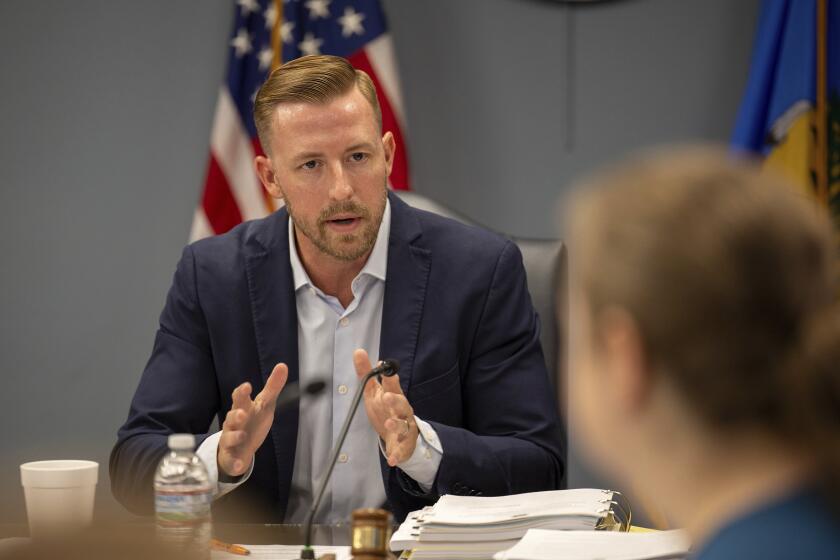Race-Based Scholarship Ban Allowed to Stand : Education: U.S. high court rejects university’s appeal. Ruling is seen as a setback to college affirmative action.
In a setback for college affirmative action, the Supreme Court on Monday let stand a ruling that bars the University of Maryland from restricting some of its scholarships to black students.
The outcome in this closely watched case threatens the “race-targeted scholarships” that are found at two-thirds of the nation’s colleges and universities.
While most scholarships are based on merit and need, about 5% of undergraduate aid and 10% in professional schools is limited to certain students based on their race or ethnic heritage, according to a General Accounting Office survey.
The University of Maryland said its Banneker program, which offered 30 to 40 black freshmen all-expenses scholarships, symbolized its commitment to overcoming its history of excluding blacks. In 1930, Baltimore-native Thurgood Marshall, who later was to sit on the Supreme Court, was barred from applying to Maryland’s law school because of his race.
But last year, in the first decision on the issue, a federal appeals court ruled that a scholarship program limited to blacks denies white students equal protection of the laws.
“Racial classifications cannot be rationalized by the casual invocation of benign remedial aims,” wrote a three-judge panel of the U.S. 4th Circuit Court of Appeals. The ruling dealt only with racial issues, not with scholarships based on gender or other criteria.
The Clinton Administration, the NAACP Legal Defense Fund and a coalition of major colleges and universities joined the University of Maryland in urging the high court to grant the appeal and to reverse the ruling. They said the ruling, if allowed to stand, would undercut minority scholarships across the nation.
But without comment or dissent, the justices rejected the university’s appeal in the case (Kirwan vs. Podberesky, 94-1620).
The action by the high court is not binding. Because the justices can freely choose their cases, a refusal to hear an appeal does not formally uphold the lower court decision.
However, the court’s refusal to even hear Maryland’s appeal, especially after the Justice Department said that it raised an issue with national implications, strongly suggests that a majority of the justices do not dispute the lower court’s conclusion.
The appeals court decision relied on a 1989 Supreme Court ruling in a Richmond, Va., case that said that the use of racial classifications by state and local governments is rarely acceptable. Even though the city of Richmond, once the capital of the Confederacy, clearly had discriminated against blacks in the past, that history does not justify discrimination in favor of blacks today, the court said in the case of Richmond vs. Croson.
The same is true in the Maryland case, the appeals court said. While blacks were excluded from the university until 1954, they make up 11% of the student body today, the court noted.
Recently, the federal courts have relied on the 1989 ruling to strike down various forms of official affirmative action, including city laws that reserve some contracts for blacks and Latinos.
Still pending before the high court is a major challenge to affirmative action programs authorized by the federal government. A white contractor is contesting a federal highway program that steers some contracts to minority-owned firms. A ruling in the case of Adarand Constructors vs. Pena is expected by the end of June.
While the Maryland case may call a halt to scholarship programs that exclude some students based on their race, the ruling does not concern financial aid programs that give an edge to minority students.
But the ruling is likely to end a legal controversy that has festered for five years.
In 1990, lawyers in the George Bush Administration told higher education officials that scholarships directed to only minorities were illegal. However, that announcement set off a political uproar and the White House backed down. It ordered Education Department officials to study the matter.
Soon after President Clinton took office, Richard W. Riley, his secretary of education, announced that “race-targeted scholarships” were legal, either as a means to “remedy past discrimination” or to “achieve a diverse student body.”
But Washington Legal Foundation, a conservative law center, decided to challenge that conclusion in court.
In 1990, Daniel J. Podberesky, a Maryland freshman, was told he could not apply for a Banneker scholarship even though he had a 4.0 grade point average and a 1340 score on the Scholastic Aptitude Test. The student said he was “Hispanic” because his mother is from Costa Rica. But his application was denied because he is not black.
Podberesky is now a first-year medical student and his lawyers said he is owed the $35,000 in scholarship aid that he was denied over the course of four years.
“I believe this case will have positive national implications,” said Richard Samp, chief counsel for the Washington Legal Foundation, who represented Podberesky. “From the beginning, this case has been clear-cut: publicly funded academic scholarships awarded on a race-exclusive basis are unconstitutional.”
Administration lawyers argued that race-based scholarships are justified at Southern universities with a legacy of past discrimination.
Citing earlier rulings in desegregation cases, the Justice Department argued that formerly segregated universities “have an affirmative duty” to take whatever steps are needed to dismantle those systems.
But despite the department’s view, the justices refused to even hear the appeal.
More to Read
Sign up for Essential California
The most important California stories and recommendations in your inbox every morning.
You may occasionally receive promotional content from the Los Angeles Times.











